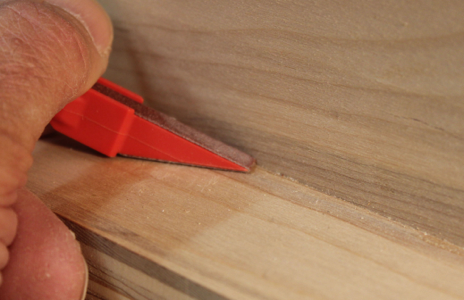Sanding Sticks - A Great Sanding Detailer
/A Little “S”ticked Off
Residing in the boondocks has advantages and an insular hobby like woodworking allows much time to think and revel in music, but the hustle and bustle of the city and the camaraderie of other woodworkers have allure, too. I’m fortunate to be able to dabble in both worlds, the quiet solitude of my workshop and the frenetic “outside” world. As frequent (and I think, cordial) as my interactions are with other woodworkers, why would you keep life-changing secrets from me?
Quite by accident (with no help from my woodworking friends, thank you) I discovered the greatest invention ever… better than the wheel, the light bulb, or the router… the Standard Detail Sanding Kit.
Figure 1 - The Detail Sanding "stick"
Years I have spend folding bits of sandpaper into odd shapes, wrapping it around pieces of wood, pencils, and popsicle sticks, gluing it onto the end of instruments of all shapes and sizes, vainly trying to sand in nooks and crevices that otherwise elude me. And there it was, all this time, the Standard Detail Sanding Kit [link].
Catchy name, by the way… perhaps if the name was “Sanding Wonder,” or “Miracle Detail Sander,” or the “Answer to Everything Sander” I would have seen this sooner and saved myself years of frustration. Did everyone know about this ingenious sanding “stick” and not tell me on purpose? Okay, that sounded a little paranoid… I will proceed under the premise that there are a few woodworkers like me that have been under a rock or in their shop too much and don’t yet know about this gadget.
Figure 2 - Push down to compress the spring and the sanding belt can be easily replaced
The Standard Detail Sanding Kit is a set of four cleverly designed spring-loaded color-coded plastic sticks to which a circular strip (belt) of sandpaper is mounted. The spring holds the nearly quarter-inch (6mm) sandpaper belt taught and in place, but also allows it to be rotated around the stick. When a section gets worn, just rotate the belt around to a new clean section. The sticks have a flat face, an angled face, a relatively sharp tip, and a rounded end, any of which can be used to sand almost anywhere, quickly, easily, and effectively. The kit includes a supply of sandpaper belts in 80, 120, 180, and 240 grits.
A 24 Piece Standard Kit includes 4 color coded sticks and 5 belts each in 80, 120, 180, and 240 grits. You can buy them by clicking here.
Figure 3 - Fine-tuning the fit of a tenon
Figure 4 - Removing glue squeeze-out
In the short couple of months since discovering these miracle, life-changing sanding tools, I have used them inside dovetail tails, on the inner walls of mortises, to sand up to the edge of adjacent pieces, to get around some spindles set into a rail, and even to help shape some shop-built curvy handles I made for a cheese serving board. These are all tasks that would have bedeviled and beguiled me in the past. Geez, why didn’t I find these sooner?
Lest this sound too much like a rave (what the heck… a well-deserved rave), there are a couple of ways to make this an even better product. The kit is sold in a plastic bag. A plastic storage box would be better. I happened to have a spare plastic box that works okay, but how much could a fitted clear plastic storage box cost? These little sticks are so valuable I wouldn’t throw them in a drawer lest they somehow get damaged.
Sanding detailer sticks are color coded, and so is the sandpaper but the gray back of the sandpaper renders the colors poorly. To help you out, I have provided a chart.
Figure 5 - Stick “grit” chart
I have, so far, only purchased the “Standard” kit, but will eventually purchase the “Finishing” kit. The inexplicable and unnecessary duplication of the 240 grit stick and belts baffles me, but what the heck?
If you knew about these tools and neglected to tell me, shame on you. If you didn’t know about them, buy a set… then tell your friends… please.






